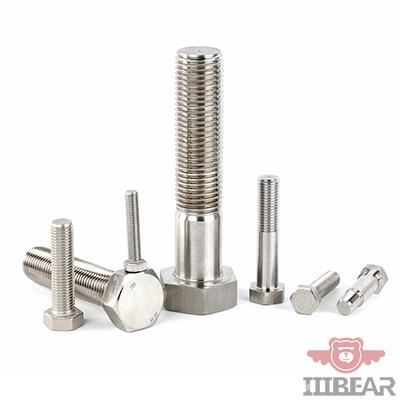Stainless steel bolts are essential components across a wide range of industrial sectors, offering strength, corrosion resistance, and longevity. However, selecting the right stainless steel bolt for specific industrial applications can be complex. Various factors, such as material grade, environmental conditions, and mechanical requirements, must be considered to ensure optimal performance and safety.
In this guide, we’ll walk you through the key aspects of choosing the right stainless steel bolt for your project needs.

Understanding Stainless Steel Grades
When selecting stainless steel bolts, understanding the different material grades is crucial. Each grade offers specific properties suited to different environments and requirements.
1. 304 Stainless Steel
304 stainless steel bolts are the most commonly used, known for their excellent corrosion resistance, strength, and affordability. They are ideal for indoor or mildly corrosive environments, such as general construction, automotive, and food processing applications.
2. 316 Stainless Steel
316 stainless steel bolts contain molybdenum, which significantly enhances their resistance to corrosion, especially against chlorides and saltwater. They are the preferred choice for marine applications, chemical processing plants, and offshore structures.
3. 410 Stainless Steel
410 stainless steel bolts are martensitic, offering high strength and hardness but lower corrosion resistance compared to 304 and 316. They are typically used where mechanical strength is a priority over corrosion resistance, such as in automotive and aerospace industries.
Key Factors to Consider When Choosing Stainless Steel Bolts
Selecting the right bolt is not just about choosing a material grade. Several other technical and environmental factors influence the selection process.
1. Environmental Conditions
Evaluate the environment where the bolt will be used:
-
Marine environments require 316 stainless steel for maximum resistance to saltwater.
-
Chemical exposure demands bolts resistant to specific chemicals, sometimes requiring special alloys.
-
High humidity or industrial atmospheres may accelerate corrosion, needing superior corrosion-resistant materials.
2. Mechanical Requirements
Consider the mechanical stresses the bolt will face:
-
Tensile strength: Ensure the bolt can withstand pulling forces without failing.
-
Shear strength: Important for bolts subjected to lateral forces.
-
Fatigue resistance: Critical in applications involving repetitive loads and vibrations.
Choose bolts that meet or exceed the mechanical properties demanded by your application.
3. Temperature Tolerance
Some stainless steel grades perform better at high or low temperatures. For example:
-
304 bolts maintain strength up to 870°C (1600°F).
-
316 bolts perform well in cryogenic temperatures and high-heat environments.
For applications involving extreme temperatures, always verify material performance specifications.
4. Standards and Certifications
Always ensure the stainless steel bolts comply with international standards such as:
-
ASTM A193 for high-temperature or high-pressure services.
-
ISO 3506 for general-purpose stainless steel fasteners.
-
DIN standards often used in European markets.
Compliance guarantees consistent material quality, mechanical properties, and traceability.
Common Applications and Recommended Bolt Choices
Understanding the end-use application will help in selecting the most suitable bolt. Below are common industries and recommended stainless steel bolt types:
| Industry | Application Example | Recommended Stainless Steel Grade |
|---|---|---|
| Marine | Boat fittings, docks | 316 Stainless Steel |
| Oil & Gas | Offshore platforms, pipelines | 316 Stainless Steel |
| Construction | Structural connections, facades | 304 Stainless Steel |
| Food Processing | Equipment assembly, conveyors | 304 Stainless Steel |
| Automotive | Engine components, chassis assemblies | 410 Stainless Steel |
Choosing based on specific application needs reduces maintenance costs and improves project lifespan.
Common Mistakes to Avoid When Selecting Stainless Steel Bolts
Even experienced engineers and procurement managers can make mistakes when selecting stainless steel bolts. Common pitfalls include:
1. Underestimating Corrosive Environments
Selecting 304 stainless steel in coastal environments often leads to premature corrosion. Always match the material to the exposure conditions.
2. Overlooking Load Requirements
Not all stainless steel bolts are suitable for heavy mechanical loads. Ignoring load demands can result in bolt failure, leading to safety risks and costly downtime.
3. Ignoring Certification and Supplier Quality
Using uncertified bolts from unreliable suppliers risks quality inconsistencies. Always source bolts from reputable manufacturers who provide material certificates.
Tips for Working with a Stainless Steel Bolt Supplier
Partnering with the right supplier ensures you receive high-quality products tailored to your project requirements. Look for suppliers that offer:
-
Custom manufacturing capabilities.
-
Full material traceability and certifications.
-
Technical support for material and design selection.
-
Global shipping and reliable lead times.
At IIIBEAR Intelligent Technology Co., Ltd., we specialize in producing high-quality stainless steel bolts for demanding industrial applications. Our engineering team can assist you in selecting the ideal fasteners for your specific needs.
Conclusion
Selecting the right stainless steel bolt is vital to ensuring the long-term performance, safety, and efficiency of industrial projects. By carefully considering material grade, environmental conditions, mechanical properties, and compliance standards, you can make informed purchasing decisions that support your project’s success.
Need expert advice or a custom quotation for stainless steel bolts? Contact us today to discuss your project needs!

